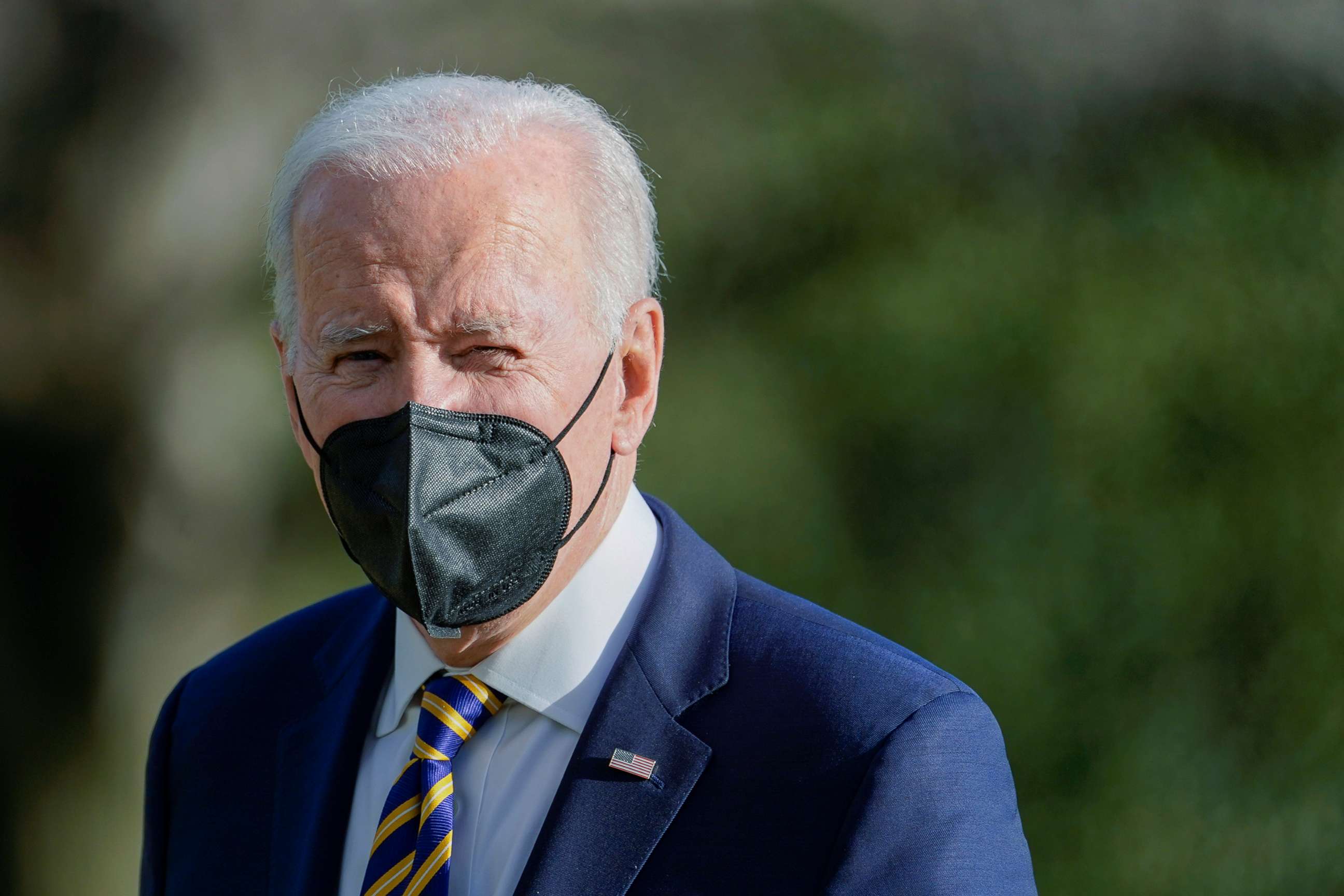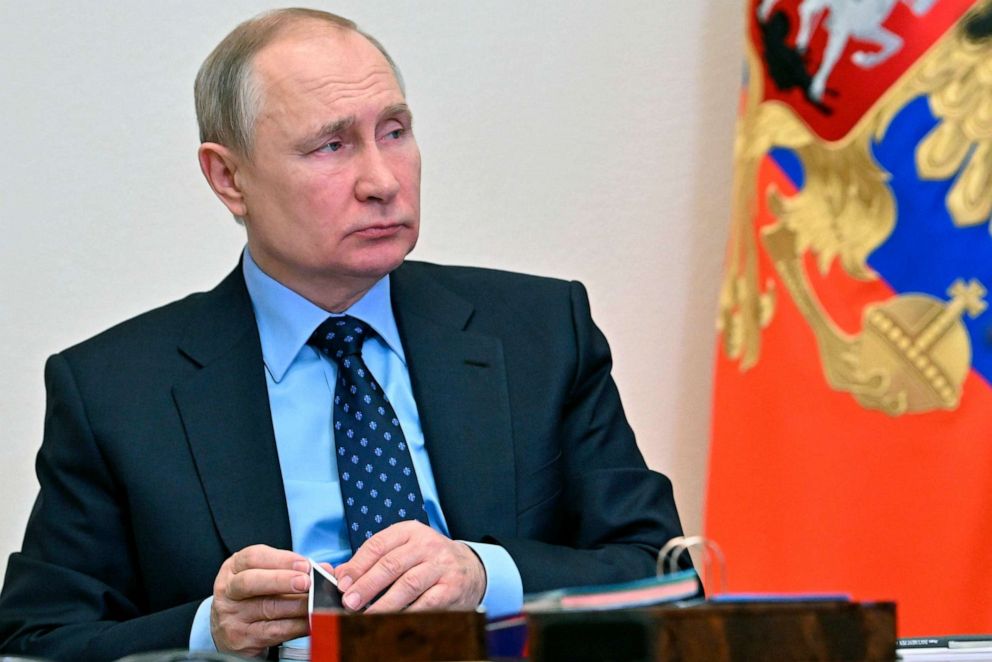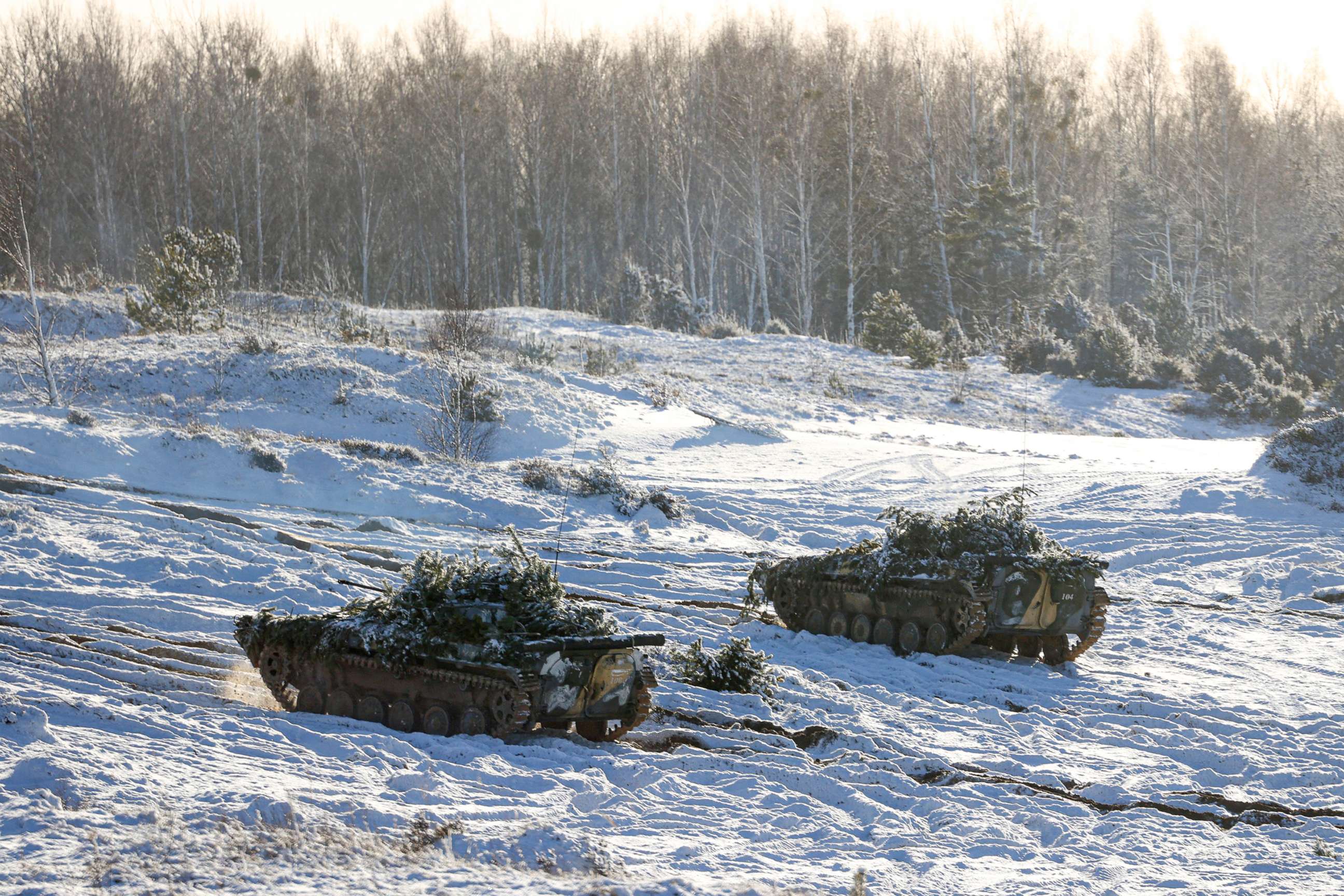Biden, Putin speak for 3rd time as US warns Russia could invade Ukraine soon
Biden spoke with Putin Saturday amid ongoing diplomatic efforts.
President Joe Biden spoke with Russian President Vladimir Putin on Saturday, a day after the U.S. warned that a Russian invasion of Ukraine could begin during the Olympics.
The two leaders spoke for just over an hour for the first time since Dec. 30, marking their third conversation amid escalating tensions over Russia's military buildup at the Ukraine border, where it has amassed over 100,000 troops.
Biden warned that the U.S. and its allies "will respond decisively and impose swift and severe costs on Russia" if it invades Ukraine, according to a brief White House readout of the call.

The president also stressed that a Russian invasion of Ukraine "would produce widespread human suffering and diminish Russia's standing," the White House said.
"President Biden was clear with President Putin that while the United States remains prepared to engage in diplomacy, in full coordination with our Allies and partners, we are equally prepared for other scenarios," the White House said.
Russia has repeatedly denied it has plans to invade Ukraine, despite the buildup on its border.
The Kremlin’s top foreign policy aide, Yuri Ushakov, told reporters the call took place in a ‘business-like” manner despite an “atmosphere of unprecedented hysteria” he claimed was being artificially inflated by the U.S.
"The last days, hours, the situation has simply been brought to the point of absurdity," Ushakov said.
“We have outlined our considerations and stressed several times that we do not understand why deliberately false information about our Russian intentions should be transmitted to the media," he continued.
A senior administration official did not detail specifics of the call, but told reporters "there was no fundamental change in the dynamic that has been unfolding now for several weeks."
The official said the countries will continue to "stay engaged in the days ahead," as military action from Russia remains a "distinct possibility."
"We are not basing our assessment of this on what the Russians say publicly. We are basing this assessment on what we're seeing on the ground with our own eyes, which is the continued Russian buildup on the border with Ukraine, and no meaningful evidence of de-escalation," the official said.
The call comes amid ongoing diplomatic efforts Saturday to defuse tensions and avoid war in eastern Europe.
On Saturday, France President Emmanuel Macron and Putin spoke at the request of Macron, Russian officials said.
The two presidents "continued their discussion on the conditions for security and stability in Europe," Macron's office said in a statement.
"They both expressed a desire to continue the dialogue on these two points," the statement continued.

French officials said Macron received personal assurances from Putin that he has no intention of attacking Ukraine. Macron raised concerns about Russian naval maneuvers near Ukraine in the Sea of Azov. "Putin did not present this movement as a precursor to attack," French officials said.
On Saturday, Russian Foreign Minister Sergey Lavrov and Secretary of State Blinken also spoke. During the 35-minute call, Blinken discussed "acute and shared concerns that Russia may be considering launching further military aggression against Ukraine in the coming days," U.S. officials said. Blinken repeated his refrain that the path of diplomacy remains available -- but if not, the repercussions will be "resolute, massive and united."
Lavrov accused the U.S. and its allies of a "propaganda" campaign and of making attempts to "sabotage" the diplomatic talks to resolve the Russian-stoked conflict in eastern Ukraine, Russian officials said. Lavrov denied that Russia has any intention to invade Ukraine, but he also didn't signal that Russia was prepared to deescalate, a senior State Department official told ABC News.
Defense Secretary Lloyd Austin also spoke with his Russian counterpart, Defense Minister Sergey Shoygu, on Saturday about "Russia's force build-up in Crimea and around Ukraine," the Department of Defense said in a brief readout.
The calls come a day after U.S. national security adviser Jake Sullivan told reporters at the White House that a Russian invasion of Ukraine could begin during the Beijing Winter Olympics, which are scheduled to end on Feb. 20.
"We can't pinpoint the day, at this point, and we can't pinpoint the hour, but what we can say is that there is a credible prospect that a Russian military action would take place even before the end of the Olympics," Sullivan said.
Following the warning, the State Department said Saturday that all non-emergency U.S. employees would depart the embassy in Kyiv, leaving only a core team of American diplomats and Ukrainian staff members.
The department also emphasized that all Americans in Ukraine should leave the country immediately.
"We encourage all American citizens who remain in Ukraine to depart immediately," Sullivan said Friday. "We want to be crystal clear on this point. Any American in Ukraine should leave as soon as possible, and in any event in the next 24 to 48 hours."
The Pentagon also ordered Saturday that a contingent of about 160 members of the Florida Army National Guard training in western Ukraine leave the country.

Over a dozen countries have joined the U.S. in telling their citizens in recent days to leave Ukraine. On Saturday, senior U.K. officials said British citizens should get out "immediately by any means." The European Union has also begun pulling out non-emergency staff.
In Kyiv, Mayor Vitaly Klitschko announced an evacuation plan Saturday and said the Ukrainian capital is preparing in case of a large-scale attack.
Russia has also announced it is drawing down its embassy in Ukraine and pulling out some staff because it fears "provocations" from Kyiv or other countries, officials said Saturday.
Ukrainian President Volodymyr Zelenskyy said Saturday that the country is ready to counter a possible Russian invasion, but intelligence claims on possible aggression coming next week and the evacuation of foreign diplomats only cause panic.
"Today in the information space, there is too much information about a deep, full-scale invasion from Russia," Zelenskyy told reporters. "The best friend of our enemy is panic in our country, and all that information which helps create only panic doesn't help us."
Russia and Ukraine held talks Thursday in Berlin, moderated by Germany and France, but after nine hours of discussion failed to agree on issuing a joint statement. The sides remained at an impasse over Russia's insistence that the Ukrainian government speak directly with Russian-backed separatist leaders in eastern Ukraine.
ABC News' Molly Nagle, Karen Travers, Patrick Reevell, Luis Martinez, Tanya Stukalova and Ben Gittleson contributed to this report.




